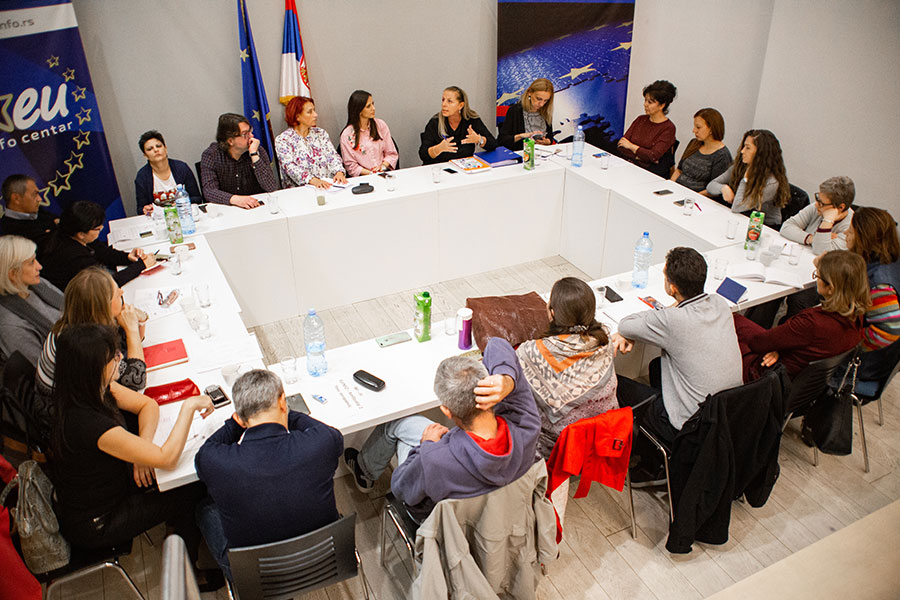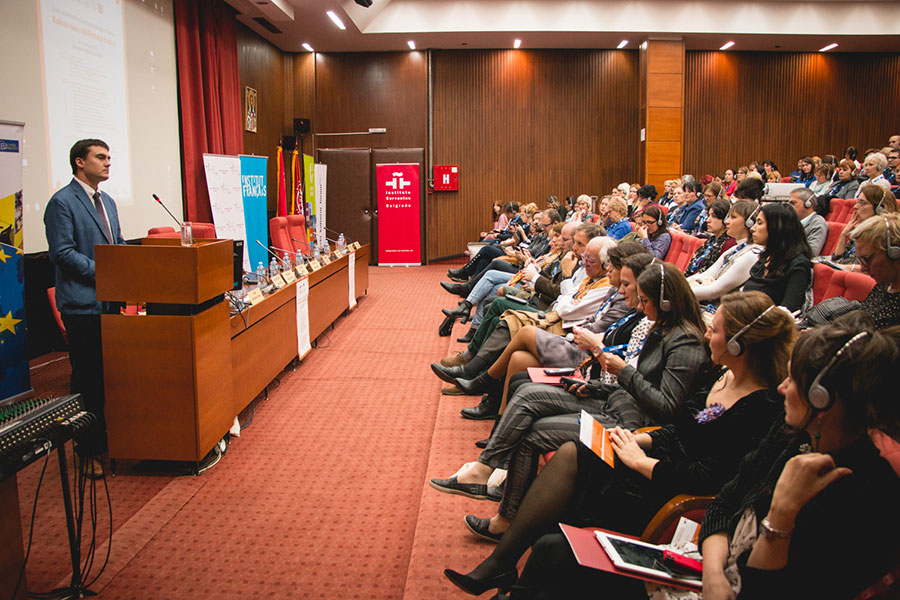Librarians from 20 EUteka network libraries took part in an international conference “What type of library do we need?” organised by EUNIC Serbia (European Union National Institutes for Culture) at the National Library of Serbia. EUteka library directors and librarians attended the conference within a two-day working visit to Belgrade, at the invitation of the EU Delegation to Serbia which lent its support for the EUNIC professionals’ conference.
EUteka network representatives’ participation in the conference is a result of good cooperation between the network and EU Member States’ cultural institutes. The cooperation with the Goethe Institute, the French Institute for Culture, Cervantes Institute, the Austrian Cultural Forum and the Italian Institute for Culture has been stepped up following two study visits to aforementioned institutes by EUteka librarians in 2017.
Following the opening remarks given by the conference host, the National Library of Serbia, the participants were welcomed by Paul-Henri Presset, Head of Information, Communications and Media at the EU Delegation to Serbia. He said that libraries should find a new place in a society, closely following the changes in the way information is conveyed. “At times when the credibility of media is questioned, libraries will play an even greater role,” Presset said and added that he is very happy with the way the EU Delegation has supported libraries by means of creating a network of 48 Serbian libraries that are interested in offering more thorough information about Europe and the EU. The participants were also greeted by Johannes Irschik, the President of the EUNIC Serbia cluster. He commended “the enthusiasm shown by libraries” and said he was certain that the conference would initiate new cooperation projects between libraries in Serbia and the EU.
The conference was a chance for everyone involved to broaden their knowledge and gain insight into their EU colleagues’ work – the way they attract new audiences, the way they change the purpose and modus operandi of their libraries, and the way they apply new technologies in their everyday work. The librarians from the EU showcased how librarians in Munich, Vienna and France overcame the challenge of communicating with adolescents and how they managed to bring them back to libraries by studying their parlance and introducing the topics and media of interest to young people. The Public Library of Belgrade and the National Library of Serbia expanded on their efforts to engage with the elderly and the way they brought them closer to new media.
 A day before the conference, the EU Info Centre hosted a working meeting between 20 EUteka librarians and an EU Delegation representative in charge of the EUteka network, Dubravka Savic. The meeting served as an opportunity to lay out the activities undertook recently by EUteka corners – the spaces specially designed to offer EU-related information – and their plans for the coming period.
A day before the conference, the EU Info Centre hosted a working meeting between 20 EUteka librarians and an EU Delegation representative in charge of the EUteka network, Dubravka Savic. The meeting served as an opportunity to lay out the activities undertook recently by EUteka corners – the spaces specially designed to offer EU-related information – and their plans for the coming period.
All libraries have shown interest to prepare presentations of the latest, tenth edition of 2018/2019 Europa Diary publication and a contest aimed at high school students organised regularly as part of the promotion of the publication. The last year’s contest garnered significant attention among high school students at a number of EUteka libraries. There is no doubt that this year’s edition of the contest will be as successful as previous.
Over the past six months, some of the EUteka libraries have devoted special attention to drawing up EU-related programmes. The libraries in Zrenjanin and Lazarevac borrowed a 2017 exhibition of Gustav Klimt’s reproductions organised by the Austrian Cultural Forum. The library in Kraljevo recently held a promotion of the publication “Myths and prejudices about the EU” published by the Ministry of European Integration of the Republic of Serbia, while the library in Uzice launched a competition for eight grade students, asking them to share their knowledge of the EU (the plan is to let students make their own presentations of EU countries in 2019). The Director of Vuk Karadzic public library from Prijepolje – another EUteka member – shared her experience in applying for EU funding. The Prijepolje library has received EU funding under a cross-border cooperation programme and thus showed that libraries too can be successful in applying for EU money. In June, the library in Cicevac showed a selection of French films, in cooperation with the French Institute for Culture, while in November, it will screen Spanish pictures, thanks to the Cervantes Institute. In Pozarevac, a France-themed tea party took place, while the library in Valjevo created a high school debate club. The library in Lazarevac joined the Europeana platform, whereas the public library in Novi Sad produced and handed out flyers to promote its own EUteka corner.
EUteka libraries have prepared activities for the coming period aimed at improving the understanding of Europe and the EU in Serbia. We believe the EUNIC conference will contribute to promoting the EUteka library network’s work.




